
44 minute read
Programmed for Perseverance, Perfection, Passion, and Performance
by Eldean Hagans
As musicians, we are programmed for perseverance, perfection, passion, and performance. We rehearse the same seven-minute piece, measure by measure, note by note, ad nauseam. Practice seems unending as we seek the elusive perfect play-through. Even when all the notes and rhythms are “perfect,” there is an expectation for passion in the music. Early in my years of piano lessons, I was so excited to be able to play my piece perfectly as printed on the page. My teacher quickly burst my bubble with “Good, now where’s the feeling … the expression … the passion?” When we finally marry quasi-perfection with passion, there looms the ever-stressful performance where it could fall apart in one blazing instant. My senior recital in college contained one of those meteor-hurtling-toward-the-earth moments when my fingers were far ahead of my brain. It was all I could do to hold the piece together until the saving grace
of the double bar. These programmed traits, which are part of a musician’s identity, can stack more stress on an already frazzled music educator; however, these ingrained practices can be harnessed to fight stress and create a meaningful life performance filled with joy.
Steve Jobs stated, “I’m convinced that about half of what separates the successful entrepreneurs from the non-successful ones is pure perseverance.” Successful musicians are experts at perseverance. It is instilled in us from early music lessons. The teacher encourages repeat after repeat until we master those first rudimentary scales. So, we must strive to apply perseverance in all aspects of life. When that sweet student continues to struggle, persevere by trying new and different teaching strategies until finally you are rewarded with that “Ah-ha” moment. When the parent-from-you-know-where decides to launch an unfounded vendetta against your reputation and instructional practices, persevere through calm communication and expert support from administrators and colleagues. When you feel like you just can’t take another day
of meetings, paperwork, and evaluations, persevere by phoning a friend who can either help ease the workload or just listen and understand.
To persevere toward perfection is in every musician’s DNA. The old saying “Practice makes perfect” still echoes through rehearsal halls and music studios worldwide. But the pursuit of perfection becomes the impossible dream considering perfect is truly just an opinion. There is a comfort in striving to do your best rather than striving for perfection. The tiny and powerful Japanese figure skater Midori Ito once said, “I have no regrets because I did my best … all I could.” One can only do the best one can do. It is our expectation of students. Why do we beat ourselves up when we do our best and it is not “perfect”? Be encouraged and motivated by the words of three-sport athlete and coach Wes Fesler: “There is nothing more perfect than doing your best.”
Just as my childhood piano teacher pointed out, it is the expressive elements that bring passion into the beat of rhythms and the movement of melodies. Likewise, the music educator’s love of music and heart for the musician breathes passion into the career of music education. When it seems every menial task and non-musical meeting is sucking the life out of your music teacher spirit, watch the face of a student as he joyfully plays the drum. He is the same student you redirected eight times at the beginning of class. But now he smiles and laughs as he attempts to echo simple four-beat rhythm patterns … and succeeds. His joy is contagious as his peers now happily participate when they previously sat with solemn faces due to his usual disruption of class. This … this is where every tired, worn-down music educator finds strength to carry on with a passion for the job that restarts the weary heart.
Performance evaluations often strike fear in teachers’ hearts; however, performance is where music teachers encourage students to shine. “Show what you know” is a commonly used adage. Perhaps we should take our own advice by using these ingrained characteristics of perseverance, perfection, and passion to create a life performance that sings in the soul of students, rocks the world of colleagues and administrators, and establishes joyful music-making for communities to embrace and celebrate.
Elementary, Middle, and High School Band, Choir, and Orchestra
2020: April 3 April 17 April 24 2021: April 9 April 16 April 23 2022: April 8 April 22 May 6
www.SMMFestival.com or call:1-855-766-3008
Eldean Hagans holds the MM from Florida State University. She is the music specialist at Meadowlane Intermediate School in Melbourne, where she has served for 17 years. She has also served in leadership positions for music organizations in Brevard County as well as at the state level. Eldean is an active musician outside of the school environment through involvement in piano accompaniment and vocal performance. With more than 27 years of experience in music, Mrs. Hagans has taught private lessons and class lessons to all ages, preschool through adult.
FLORIDA ELEMENTARY MUSIC EDUCATORS ASSOCIATION Ernesta Chicklowski, President
A good beginning makes a good end. — English Proverb
Ihope your 2020 is off to a great start personally and professionally. The new year is a time of hope and renewal. The beginning of each year brings refreshing changes as well as new goals and adventures. As we leave one more year behind and move forward into the next one, here’s hoping 2020 brings you and yours a successful year of adventures in teaching elementary music and that you and yours are healthy and happy. This is an exciting to time of year to take risks with your students’ musicality, to challenge them to learn a new instrument or skill, and to explore various ways to express themselves in your music classroom.
The 2020 FMEA Professional Development Conference was a refreshing and revitalizing way to kick off this new decade, with incredible professional development, networking and sharing with colleagues, and inspirational concerts. What a wonderful whirlwind conference week was!
This first conference serving as FEMEA president was a very exciting experience; my heart is overflowing with gratitude and pride in our professional organization. I am privileged to lead an outstanding FEMEA team of district chairpersons: Meghan Alfaro, Ashley Peek, Pauline Latorre, Eldean Hagans, Jenny Chambless, Sydney Johnson, Jason Thomashefsky, and Lesleigh Howard-Zeno. Thank you doesn’t seem like enough words to express my gratitude to our FEMEA Executive Board: Jennifer Sullivan (executive director), Rosemary Pilonero (immediate past president), and Joani Slawson (president-elect), along with the amazing coordinators of our All-State Elementary Chorus and our All-State Elementary Orff Ensemble, Robert Todd and Holly Mullinex.
I am excited about our ongoing work to move our organization forward for the benefit of Florida’s elementary music educators and students. Special thanks to our vendors and supporters: West Music (Judy Pine), Music Is Elementary (Ron Guzzo), and Peripole (Andrew Perry), who made it possible to have clinicians and instruments for sessions and for our All-State Elementary Orff Ensemble.
We were honored and inspired at the 2020 conference by our headliner clinicians who brought their wealth of knowledge and passion to the elementary music teachers of Florida: Dr. Rene Boyer (Peripole), Matt Stensrud (West Music), and Karen Howard (Music Is Elementary). The FEMEA part of the conference couldn’t happen without the support and diligent work of the FMEA team: Kenneth Williams, Steve Kelly, Val Anderson,
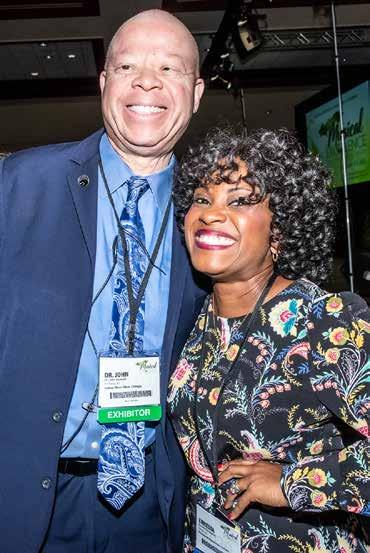
Kathy Sanz, and Josh Bula, and the FMEA Conference Planning Committee. Heartfelt thanks and congratulations to John K. Southall, chairman of the Conference Planning Committee.
We wrapped up the 2020 conference by announcing our election results for the even-numbered district chairpersons. Thank you for taking time to vote online. We welcome these new district chairpersons who will serve for two years on the FEMEA board: Dorothy Yorty (District 2), Sydney Johnson (District 4), Shannon Stem (District 6), and Luis Rios (District 8). Congratulations to all, and I look forward to working with you to serve the elementary music teachers and students of Florida. FMEA 2020: What a great week of inspiration and artistry to carry us forward in our profession! I am honored to serve our organization.
The 2020 FMEA Professional Development Conference was fantastic! I was in awe of the keynote speakers and interest session clinicians, of the invited performing groups and the all-state ensembles, of the exhibitors and sponsors, of the FMEA awards recipients, and of our incredible members. This was one for the books, and one I will not soon forget! Each year, there are several people to thank for their efforts in support of the Florida Vocal Association at the FMEA conference, and this year is no exception! FVA had an amazing team of coordinators working with our all-state conductors, accompanists, and students. Thank you to Jeannine Stemmer, Tommy Jomisko, Liz Phillips, Andrea Peacock, Thomas Desmond, and John Luffred. Thank you also to Dale Choate for another outstanding adjudicator renewal workshop, to Carlton Kilpatrick for coordinating the choral performances in the convention center ballroom, and to Paul Miller for accompanying our FVA-sponsored reading sessions. We are always grateful to Marilyn Wirsz and Head’s House of Music for their assistance and support with the all-state choruses and our reading sessions. Thank you to Mark Scott and Jo Hagan, who work very hard behind the scenes to keep everything running like a well-oiled machine. Finally, the biggest share of our annual FMEA conference work falls to Jay Dunn, our clinics chairFLORIDA VOCAL ASSOCIATION Jason Locker, President
man and representative to the FMEA Conference Planning Committee. Thanks to Jay for shouldering this huge responsibility, and for completing his many conference tasks throughout the past year with excellence and grace.
We are now well into MPA season. I wish all of our members and students a positive and meaningful educational experience at this year’s district and state MPA events. At their best, MPAs are a tool we can use to improve our students’ performance and our own instructional practice. I have always told my students there is no such thing as a perfect performance, and there is always room for them (and for me) to get better. I hope we all can embrace that point of view, and remember there is a great deal more to the MPA experience than the top right corner of the adjudication sheet! Thank
FLORIDA COLLEGE MUSIC EDUCATORS ASSOCIATION Marc Decker, DMA, President
Thanks to everyone who helped make the 2020 FMEA Professional Development Conference a success! It was a pleasure connecting with colleagues, exchanging ideas, and learning new methods and techniques to help us evolve into more effective music educators.
The FCMEA business meeting was equally invigorating and productive. For over a year now, past president Dr. Stacie Rossow has been working to draft bylaws that solidify our governing rules and purpose. The membership reviewed the provisional bylaws at our fall meeting, and in January voted overwhelmingly to adopt them. We’ve always known our purpose, but up until now have failed to write it down for the world to see. The purpose of FCMEA shall be to: « Promote teaching at the collegiate level in the state of Florida « Encourage improvement and advancement in college and university music programs
Sandra Adorno, PhD FCMEA president-elect « Encourage communication between the colleges and universities in the state of Florida « Address common issues at the colleges and universities in the state of Florida « Encourage and assist the professional growth of the membership Another important action the membership took at our meeting was to fill an immediate vacancy in the position of president-elect. Please join me in welcoming Dr. Sandra Adorno from Florida International University who will immediately assume the duties of the FCMEA president-elect.
We encourage all of our members to submit proposals for the 2021 FMEA Professional Development Conference and hope you have a fantastic spring term!

you to MPA chairwoman Deborah Mar and technology chairman Brandon Monse for their work on the 2020 MPA Omnibus, which can be found on our website (FVA.net) on the Governing Documents page. Thanks also to Kevin Albright for his continued work composing the exercises for our MPA sight-reading books.
For high school entries that receive a superior rating, please make sure you register in a timely fashion if you choose to participate in our outstanding state solo and ensemble MPA or state choral MPA events. Mark Scott does his best to accommodate schools’ scheduling requests, but he cannot guarantee that each school will get its requested schedule. Early registration and payment increase the likelihood you will receive your preferred schedule for state MPA events.
MPA season can be stressful for secondary music educators. Do yourself a favor and schedule some quiet time on the calendar during these months. Thank your district chairperson for the sacrifices made on your behalf, and your adjudicators for sharing their expertise. Most importantly, tell your students how much you care about them and appreciate all of their hard work. Choral music is alive and well all over the state of Florida, and I look forward to hearing your fine work over the next several weeks!
«Be confident. Now is the time to fake it until you make it. Your first day, maybe your first week, will definitely be scary and may be a little intimidating. Students can tell when you’re nervous, and if you let them, they can read your emotions like a book. The more time you spend acting confident, the more confident you will become. Remember that you have spent many long semesters preparing for this—you can do it! « Don’t be afraid of what you don’t know. If you already knew everything there was to know about teaching, you wouldn’t need to do an internship. In fact, the day you think you know everything there is to know about teaching is probably the day you should retire. Your mentor teacher and university coordinators and supervisors are there to help you. Don’t be afraid to ask for help! Use all of the resources you have available to gain as much knowledge as you can from this experience. « Capitalize on what you do know. Plan a lesson on something you are extremely knowledgeable or passionate about. If you have extensive knowledge of a particular instrument, help the students who play that instrument. If you know how to play to your strengths, students will trust you and your expertise. Put yourself in a position to be successful by allowing students to see you do something you’re experienced in. « Be professional. Being punctual, staying organized, and dressing appropriately will go a long way toward making a good impression, not only to your mentor teacher, but to your host school’s faculty, staff, and administration. It is better to be overdressed for the first two weeks than to have an awkward conversation about appropriate attire. Always remember the golden rule—early is on time, and on time is late! « Learn your students’ names as soon as possible. Make sure your students understand that you value them as a human being, not just as clarinet number seven. Greet them as they come into your classroom and say good-bye to them as they leave. Ask them about their other classes and interests outside of music. Students are people, too! « Be open to feedback. Remember that you are here to learn and to improve yourself as an educator. Take all feedback into consideration. Even if you don’t like or don’t agree with an idea, comment, or suggestion, try it anyway. Sometimes you learn what to do, and sometimes you learn what not to do. Either way, you will learn something, and you can’t learn anything without trying new things. « Most important—have fun! This is the culmination of years of work toward your music education degree. Remember why you chose this vocation to begin with. Cherish the moments you have with your students and learn as much as you can. You are the future of music education! STUDENT TEACHING What You Need to Know, From the Perspective of a Student Teacher
FLORIDA BANDMASTERS ASSOCIATION Cathi Leibinger, President
I’m not sure if this is true for anyone else, but we are well into our new year and I’m still having trouble writing “2020” when asked to fill in the date on forms. It’s amazing how much faster time goes by when multiple tasks are looming and deadlines are approaching like moths to a flame. As I look back, our 2020 FMEA conference seems so long ago, when it has really been less than a month since we were all together, learning and laughing in Tampa.
Early in my career, I was always in awe of the more experienced master teachers and how they could walk through the Tampa Convention Center greeting everyone they met confidently and by name. I truly felt the need for connection with each other and the importance of gathering together regularly to strengthen those connections. Social media has made it easier for us to keep in touch, but it will never replace the need to interact with each other in person. The handshakes, hugs, and even simple eye contact received in those few days at FMEA can be rocket fuel to launch us into the spring semester. I am so grateful for those moments together.
One of the most educational memories I have is of sitting next to Jim Hacker at FMEA, chatting about life and work. The content of the conversation wasn’t particularly memorable, but rather, it was how it ended. The clinician was introduced and began the presentation. Mr. Hacker proceeded to take out a small notebook and pen and take notes, actively seeking to continue learning even when he had the reputation of being a master teacher. I’m thankful for the example he set, and while my notes are in electronic form on my phone, I continue to follow that example and hope to set the same for the next generation. Here are some of my reflections and favorite moments from FMEA 2020: « I absolutely loved watching the AllState Elementary Chorus during the opening session. The day before, I had walked by the group’s rehearsal and was stopped in my tracks by what I was hearing in the warm-up. Later, I saw the conductor, Robyn Lana, and told her I truly enjoyed watching her, learning a few new tricks I could take back to my own classroom. « During the FBA “Meet the Conductors and Composers” session, I facilitated a discussion with Dr. David Waybright, Dr. David Ragsdale, and Haley Woodrow, the composer who wrote the FBA commissioned piece, HIM. Ms. Woodrow made the wise insight that we should make sure Sonic Escape
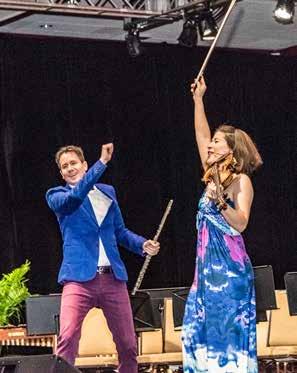
Florida Music Director that students can focus on rehearsing to make music, not to avoid making mistakes. « I had the fantastic opportunity to sit next to Dr. Cliff Madsen during the opening session. We had a fascinating discussion about bias being about more than gender and race. (I wanted to take notes on my phone, but I was afraid he might have a “paper and pencil” bias, so I waited until later to do so.)

«Dr. Libby Larsen’s presentation on the evolution of music and “content on demand” requires that we think about our current music education models carefully. « Sonic Escape is one of my new favorite ensembles for YouTube brain breaks during class. « Watching Gary Green conduct the AllState Intercollegiate Band really makes me wish I had attended college in Florida. « Calista Zebley worked magic with the Middle School Honors Band. It was truly an amazing concert and was so much fun to hear. « Jody Dunn’s work with the High School Honors Band was equally outstanding and just so musical. « Walking past the UF booth in the exhibits, I gave a cool “head bob” to Dr. Dre Graham, 2020 Florida Teacher Dr. Libby Larsen
of the Year, only to realize that it was actually only a life-size cutout of this amazing teacher.
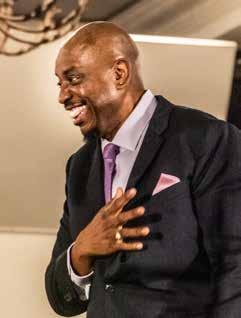
«Our All-State Middle School Jazz Band under Cleve Maloon rivaled many high school ensembles, while the All-State High School Jazz Band premiered a new piece by its director, Mike Tomaro, who told everyone, “This is probably one of the best all-state jazz bands I’ve ever worked with.” Cleve Maloon
«The 2020 FMEA All-State Bands AllStar Lineup: • Omar Thomas, composer (The AllState Concert Band played A Mother of a Revolution; the Symphonic Band played Come Sunday.) • Haley Woodrow, composer (The All-State Middle School Band played the world premiere of the FBA commissioned work, HIM.) • Steve Danyew, composer (The All-State Concert Band played the world premiere of Entrata, written for Gary Green.) • Conductors Michael J. Garasi, AllState Middle School Band; Dr. Dave Ragsdale, All-State Concert Band; and Dr. David Waybright, All-State Symphonic Band This was definitely one of the most inspiring FMEA conferences I have attended. I have a special appreciation for Dr. Steve Kelly, FMEA president, and his theme for this conference, Celebrating Musical Excellence: Past, Present, & Future. Dr. John Southall and his Conference Planning Committee also deserve accolades for the tireless work they do to make our FMEA such a success. I am proud to be a music educator in Florida.
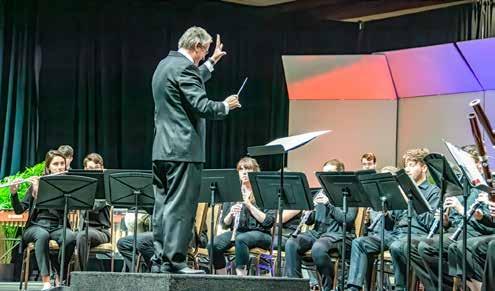
Dr. Patrick Dunnigan conducting the Florida State University Wind Ensemble Cathi Leibinger with Phil Wharton
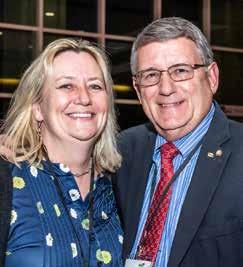
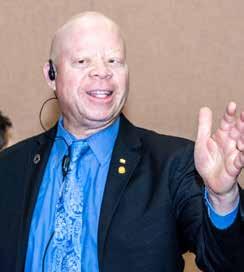
Dr. John Southall

FLORIDA MUSIC SUPERVISION ASSOCIATION Harry “Skip” Pardee, President
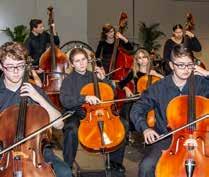
44 Florida Music Director FLORIDA ORCHESTRA ASSOCIATION Matthew Davis, President I t was great to see all of you at our wonderful FMEA Professional Development Conference! I hope you were inspired by the sessions, the guest speakers, and the various performances. Again, I would like to thank all of the session presenters and coordinators as well as our all-state students and conductors for exhibiting true artistry. On behalf of the FOA Executive Committee, we would like to thank our all-state coordinators, Andrea Szarowicz, Steven Bossert, Vivian Gonzalez, Sarah Taylor, and William Sanderson, for their outstanding service and dedication to creating a positive and successful musical experience for our students. We would also like to thank Erik Bryan and the Eau Gallie Chamber Orchestra for their outstanding performance at the conference.
Thank you to the members for attending our FOA general membership meeting. It’s hard to believe we are already planning for our 2020-21 Fall/FMEA conferences! If you have any suggestions, please email me at mdavis@myfoa.org. Thank you for your support.
As we head into the MPA season, please be mindful of the following dates: « March 13, 2020 State Solo and Ensemble MPA Application Postmark Deadline « April 3, 2020 State Concert MPA Application Postmark Deadline « April 4, 2020 State Solo and Ensemble at Strawberry Crest High School, Dover « April 20-22, 2020 State Concert MPA at Blake High School, Tampa Our state concert MPA adjudicators and clinicians are Dr. Stephen Benham from Duquesne University, Dr. William LaRue Jones from University of Iowa, Dr. James Mick from Ithaca College, Dr. Robert Gillespie from The Ohio State University, and Dr. Mark Laycock from Wichita State University.
As always, please feel free to contact any of us on the board with your questions or concerns.
I wish you the very best on your district MPAs this year. Please take time to encourage your students to listen to the music beyond the page. O n behalf of all the music program leaders in our beautiful state, I would like to thank you for being members of a truly vibrant professional organization in FMEA! Nothing is clearer to me each January after attending the annual professional development conference in Tampa. As the Conference Planning Committee wrapped up the Sunday morning meeting, I was yet again astounded by the success of the conference, due in no small part to phenomenal Executive Board and Board of Directors’ leadership and our dedicated membership. We are all part of a truly noble profession, and it is a privilege to serve Florida’s students along with you.
One particular thought struck me at this conference: the clear and cohesive ties to the timely conference theme of Celebrating Musical Excellence: Past, Present, & Future. Each embrace from old colleagues we have not had the opportunity to see for some time was in and of itself musical excellence. Each preparatory beat the all-state conductors gave to our talented students before their performances was in anticipation of musical excellence in the present. And of course, each professional development session attended by music educators in our state looked to the presenter’s resources and skills to move their own music programs into the future. These experiences from our time together only strengthen our efforts in music education in our communities. As leaders in the arts, we know too well the challenges teachers have in attending relevant, practical, and long-lasting professional development opportunities specific to their field. The 2020 FMEA Professional Development Conference certainly provided that for our profession. Thank you! As we look to the coming months, take advantage of any and all opportunities to apply that musical excellence experienced at the conference in your own program. Music educators put in a remarkable amount of work to ensure a well-rounded education for our students, and I hope you can consider some of the great strategies learned from the conference in your classrooms in an effort to streamline that work. Have a wonderful third quarter with your students!
This on-going column seeks to stimulate awareness of research issues for FMEA teachers and researchers.

RESEARCH COMMITTEE CHAIRMAN
Don D. Coffman, PhD University of Miami
What might teachers do to assess student motivation?
Experienced teachers know that some learners are harder to inspire than others. I regularly remind my students of this formula: “Motivation
= Efficacy x Value”—if either of these two factors (belief
that one CAN achieve; belief that achieving is WORTH it)
is “0,” then the equation yields zero motivation.
Yet this formula is admittedly overly simplistic, fail
ing to reveal any of the elements of motivation, which is
multifaceted. One assessment approach to understanding
student motivations is the MUSIC model of academic
achievement (Jones, 2009), which postulates five aspects
that are represented in the acronym: eMpowerment,
Usefulness, Success, Interest, Caring. An 18-item ques
tionnaire asks students to indicate how they feel about
the subject (empowerment, usefulness, interest) and
about the teacher (caring). The assessment was designed
for any subject in school. The author’s website (themu
sicmodel.com) has a user manual that shows how to
administer and score various versions of the inventory,
from elementary school age to college age students and
in various languages.
More recently, some music researchers (Parkes et al.,
2017) administered a version of the middle school/high
school inventory, tailored for music, to 93 students in 5 th
through 12 th
grade in one school who were in general
music or band classes. Students responded to the MUSIC inventory items on a 6-point Likert-type scale with the following descriptors: 1 (strongly disagree), 2 (disagree), 3 (somewhat disagree), 4 (somewhat agree), 5 (agree), and 6 (strongly agree). The MUSIC inventory consisted of the following number of items for each component: four items for empowerment (e.g., “I have choices in what I am allowed to do in music class”), three items for usefulness (e.g., “In general, music class work is useful to me”), four items for success (e.g., “I am confident that I can succeed in music class work”), three items for interest (e.g., “The music class work is interesting to me”), and four items for caring (e.g., “My music teacher cares about how well I do in music class”). Confirmatory factor analysis verified the validity of the inventory, and Cronbach’s alphas showed good reliability for the inventory.
This nuanced assessment tool could reveal to a teacher which aspects of a class are aligning with students’ interests and which aspects are missing the mark. The Parkes article is free to NAfME members from the publications page of the website listed within the references below. I encourage you to give it a read.
References
Jones, B. D. (2009). Motivating students to engage in learning: The MUSIC Model of Academic Motivation. International Journal of Teaching and Learning in Higher Education, 21, 272-285.
Parkes, K. A., Jones, B. D., & Wilkins, J. L. M. (2017). Assessing music students’ motivation using the MUSIC Model of Academic Motivation Inventory. Update: Applications of Research in Music Education, 35(3), 16-22. https://doi.org/10.1177/8755123315620835
DIVERSE LEARNERS COMMITTEE Alice-Ann Darrow, PhD, Chairwoman
Positive Alternatives to the Troubling Reality of Restraint and Seclusion in Schools
In a letter to U.S. Secretary of Education Betsy DeVos this past January, two senators and 10 members of Congress called for the Department of Education to ban seclusion and prohibit certain restraint techniques in the nation’s schools. Data indicate these types of disciplinary actions are most frequently used with students who have disabilities (Diament, 2020). While many states have guidelines for the use of these controversial practices, the guidelines are not uniform across states. Schifter (2019) makes the case for federal legislation reporting that restraint and seclusion are to be used only as a last resort when all other options have failed; however, they are frequently overused, and too often their misuse has resulted in the death of students. Schifter further justifies the need for legislation banning seclusion and restraint based on discriminatory practices regarding students with disabilities and students of color:

In the 2015-2016 school year, 122,000 students across the country were restrained or secluded, according to data from the Civil Rights Data Collection. Students with disabilities and African American students were disproportionately disciplined in this way. Even though students with disabilities make up 12 percent of total enrollment across the country, they make up 71 percent of students who were restrained and 66 percent of the students who were secluded; African American students make up 15 percent of total enrollment, and yet they represent 27 percent of those students were subject to restraint and 23 percent of those students who were secluded in school. (p. 3)
Complicating such discriminatory practices, the U.S. Government Accountability Office (U.S. GAO) (2019), a federal watchdog, has reported data indicating many school districts underreport or even fail to report uses of seclusion and restraint. Some states, such as Florida, have passed laws (see Florida Statutes § 1003.573) that establish the documentation, reporting, and monitoring requirements for the use of seclusion and restraint (Online Sunshine, 2020); however, unlike the use of seclusion and restraints in juvenile justice facilities and mental health facilities, there is currently no federal law
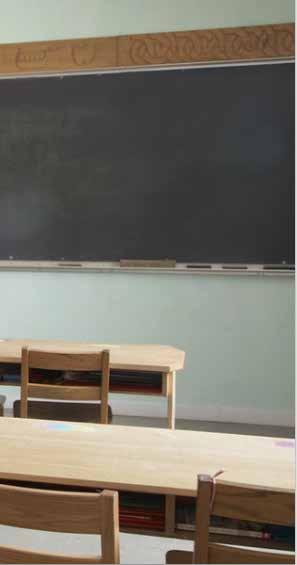
that specifically addresses appropriate limitations on the use of these practices in the nation’s schools. Over a decade ago, the Government Accountability Office reported its staff had found hundreds of cases of alleged abuse and death related to the use of these methods (Schifter, 2019). Students with disabilities are particularly vulnerable victims. Students with autism spectrum disorders or other disabilities who may be nonverbal are unable to self-report if they have been restrained or put in seclusion.
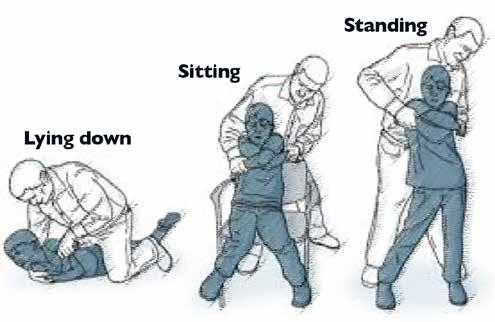
Why are seclusion and restraint used in schools? When students pose a threat to themselves or others, school administrators, resource officers, or other trained personnel may need to restrain them physically or remove them from the classroom to a safe space. Students are allowed the time and space they need to calm themselves. Sadly, when these types of discipline go awry, students can be traumatized, injured, or even killed. The risks for misuse, overuse, injury, or death are too great. All children deserve to be safe in school (Abamu, 2019).

How are seclusion and restraint used in schools? Restraint involves the use of physical force to restrict a student’s movement. The student may be held by his or her arm or held to the floor by an adult’s body weight. Other devices such as straps or pharmaceuticals are also used to restrain students’ physical movements. Seclusion involves placing students in locked rooms or other smaller spaces from which they are unable to leave voluntarily. The rooms may have small windows, but no chairs or desks that can be thrown or broken. Time-out corners or tables are also considered seclusion, though students are not generally enclosed in such spaces; thus, teachers can easily check on the students and the students can see out. For us as musicians, it is likely not surprising that Continued on page 48
DIVERSE LEARNERS Continued from page 47
researchers found when music has been played in seclusion rooms, the individuals confined calmed faster and were released earlier than in rooms when music was not played (Lai, Su, Lin, Yu, Lin, 2010).
Individuals with disruptive tendencies rarely respond well to seclusion or restraint. Consequently, other more positive research-based practices are recommended by numerous professional organizations, such as the Council for Exceptional Children, and by the Individuals with Disabilities Education Act (IDEA, 2004). IDEA requires PBS (positive behavioral supports) be considered in all cases of students whose behavior impedes their learning or the learning of others. Results of research reports in the Journal of Positive Behavior Interventions often indicate that positive behavioral supports are effective as the first-line approach to managing students’ disruptive behaviors. The term approach is important, as PBS is not a specific intervention or technique, but rather strategies that are a part of the approach.
Other Disciplinary Options for Music Educators Positive Behavioral Support (PBS) refers to a range of preventive and positive interventions designed to create supportive


and successful environments for students’ social or academic deficits. PBS is a comprehensive research-based approach intended to address all aspects of a student’s problem behavior. PBS involves a proactive, collaborative, assessment-based process to develop effective, positive individualized interventions for students with challenging behaviors. Along with reducing problem behaviors, the approach is structured to address quality-of-life issues and plans for the student’s future. It is an approach that merges values regarding the rights of people with disabilities with practical application of how learning and behavior change occur. The principal goal of PBS is to improve the daily life of students and their support providers in home, school, and community settings (Hallahan, Kauffman, & Pullen, 2017; Turnbull, Turnbull, Wehmeyer, & Shogren, 2016). PBS is supported by recent mandates, including amendments to the Individuals with Disabilities Education Act, which call for the use of functional behavioral assessments and positive supports and strategies (IDEA, 2004).
PBS has three primary features: 1) functional (behavioral) assessment; 2) comprehensive intervention; and 3) lifestyle enhancement (Kauffman & Landrum, 2013): « Functional assessment is a process for identifying the events that prompt and maintain problem behavior. This
process involves information gathering through record reviews, interviews, observations, and the development of summary statements that describe the behavioral patterns identified and their functions. « A comprehensive intervention or plan is developed that includes multiple proactive strategies. These strategies are structured to: a) change the environment so that triggering events are removed; b) teach new skills that can replace problem behaviors; c) eliminate or minimize natural rewards for problem behavior; and d) maximize rewards for new replacement behaviors. The key principle of PBS is the comprehensive approach to improving multiple areas of students’ lives: their personal relationships, social and academic activities, and health (Turnbull et al., 2016). « PBS outcomes include lifestyle enhancements such as building and maintaining meaningful relationships, expressing personal preferences and making choices (self-determination), and participating in community activities. Such lifestyle enhancements are facilitated by establishing a positive long-range vision with the student and his or her family, and then, through effective collaborations, assembling natural supports to realize the vision (Kauffman & Landrum, 2013).
Music Participation as a Positive Behavioral Intervention and Lifestyle Enhancement We are fortunate as music educators that our subject matter is an inherently nonthreatening and inviting medium. Music offers the reluctant student a safe environment in which to explore and express emotions. It is also adaptable in ways such as style, age appropriateness, and sophistication and, as a result, is applicable to a AWARDS COMMITTEE Debbie Fahmie, Chairwoman
Ienjoy hearing the perspective of others regarding the FMEA Awards Program. This year, Sondra Collins, music teacher in Marion County, joined the Awards Committee. She has had experience on the receiving end as both her principal and one of her school board members have won FMEA awards in the past. I asked Sondra to share her thoughts with me regarding the awards program having now been on this side of things.
I love the call to action that Sondra gives us. As this year’s nominations open up, please be sure to think of those in your sphere of influence who are worthy of recognition. I look forward to receiving many wonderful award applications again this year.
Here is what Sondra had to say …

This year I have had the privilege of serving on the FMEA Awards Committee, helping choose the FMEA 2020 awardees. This work could not be more hum bling, more worthy, or more important to our mission—to promote quality, comprehensive music education in all Florida schools. What better way to pro mote music education than to shine a spotlight on those that do good? The applications are stunning. The level of amazing music education in this state is truly astounding. If anything, the committee had a difficult time choos ing just one awardee in each category, with such excellence in every application packet. Over and over again, committee members stated phrases such as “this is another tough one” and “all these applicants are excellent.” And yet, an awesome, select few rose above others in aspects of leadership, service, and excellence in music education. One such awardee, the FMEA 2020 Secondary Music Educator of the Year, Mr. Michael Dye, described the expe rience as one that “is a confirmation of all that I have tried to do as a music educator for 44 years.” He then went on to describe seeing another fellow music educator be awarded the same award in a previous year: “When Carlton Kilpatrick came onto that stage a couple of years ago at the general session, I was like, ‘Wow! That’s one of us up there being honored for the same things most of us do every day. Maybe I could be there someday myself.’ I was moved by that moment! It made me feel more important for the job I do. It was a signif icant moment for me and the people who know Carlton.” Michael Dye, and all our FMEA 2020 awardees—you are there. You have moved us. You have made us feel more important for the job we do. We thank you. Fellow music educators, you, too, could be there someday yourselves. You, too, could be recognized for the job you do on a daily basis. And you, too, could hold up others in similar high regard for this wonderful little thing— their excellence in music education. Let’s all promote quality, comprehensive music education. It’s high time we raise each other up, help each other feel more important, and give each other significant moments.
DIVERSE LEARNERS Continued from page 49
EMERGING LEADERS COMMITTEE Mary Palmer, EdD, Chairwoman
Nominations are now open! It’s time to identify our 2020 FMEA Emerging Leader candidates. Do you know someone who has the potential to be a leader and champion for music education at his or her school, community, region, state, nationally or beyond? YOU might be that person yourself! It’s time for nominations (self-nominations are accepted) to the FMEA Emerging Leaders program. More information is included at https://fmea.org/programs/emerging-leaders/.
Why become a part of the FMEA Emerging Leaders? « Meet other enthusiastic people who are destined for leadership in music education … share the excitement and possibilities together! « Meet and interact with FMEA and NAfME leaders. « Serve FMEA in various ways at the 2021 Professional Development Conference. « Be a 2021 conference presenter as part of the Emerging Leaders program. « Be inspired and informed at the summer 2020 Emerging Leaders Conference (on June 13, 2020, at the University of Central Florida in Orlando). « Expand your horizons as you expand your professional network. Let’s build for the future together! Please take time to nominate the next FMEA Emerging Leader candidates today!
Congratulations to the 2020 FMEA Emerging Leaders who were presenters for our annual Pecha Kucha style conference presentation:
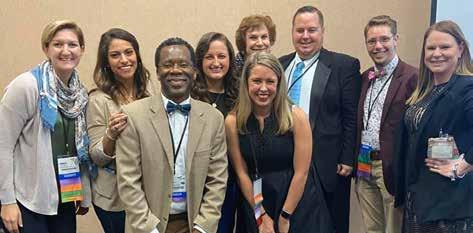
Back row: Amber Svetik (Electa Lee Magnet Middle School, Manatee County), Giselle Panagiotakis (Lakewood Ranch High School, Manatee County), Alexis Pletincks (Bayshore High School, Manatee County), Dr. Mary Palmer (chairwoman), William Mollineaux (The Osceola County School for the Arts, Osceola County), John Koenig (River Springs Middle School of Technology and Innovation, Volusia County), and Malissa A. Baker (Manatee County)
Florida Music Director wide range of student ages and abilities. Nearly all students respond positively to music; thus, this response establishes a strong foundation for engaging in prosocial behaviors. Participating in music making can result in the development of meaningful relationships and can provide opportunities to take part in community music activities as adults. Meaningful relationships and engaging activities are lifestyle enhancements that provide natural supports all students need to succeed in school and in life.
References
Abamu, J. (2019, June). How some schools restrain or seclude students: A look at a controversial practice. Retrieved from https://www.npr.org/2019/06/15/729955321/ how-some-schools-restrain-or-secludestudents-a-look-at-a-controversial-practice
Diament, M. (2020, January). Education department urged to ban seclusion in schools. Retrieved from https://www.disabilityscoop. com/2020/01/17/ed-department-urged-toban-seclusion-in-schools/27670/
Hallahan, D. P., Kauffman, J. M., & Pullen, P. C. (2017). Exceptional learners: An introduction to special education (12th ed.). New York, NY: Pearson Educational.
Individuals with Disabilities Education
Improvement Act, Pub. L. No. 108-446, 20 U.S.C. 1400 et seq. (2004).
Kauffman, J. M., & Landrum, T. J. (2013).
Characteristics of emotional and behavioral disorders of children and youth (10th ed.). New York, NY: Pearson Educational.
Lai, C. Y., Su, Y. Y., Lin, S. T., *Yu, C. Y., & Lin, Y. C. (2010). Music and restraint: Emotional control effects on psychiatric patients kept in seclusion. Journal of Nursing and Healthcare Research, 6(4), 308-318.
Online Sunshine (2020, February). The 2011 Florida Statutes s. 1073.573. Retrieved from http://www.leg.state.fl.us/ Statutes/index.cfm?App_mode=Display_Statute&URL=1000-1099/1003/ Sections/1003.573.html
Schifter, L. A. (2019, February). The need for
federal legislation on seclusion and restraint. Retrieved from https://tcf.org/content/ commentary/need-federal-legislation-seclusion-restraint/?session=1
Turnbull A. P., Turnbull H. R., Wehmeyer M. L., & Shogren K. A. (2016). Exceptional lives: Special education in in today’s schools (8th ed.). Upper Saddle River, NJ: Pearson Education.




GOLD PARTNERS
SILVER PARTNERS University of North Florida





BRONZE PARTNERS Cannon Music Camp - Appalachian State University Florida College Florida Gulf Coast University Florida Southern College Holy Cross Lutheran Academy Infinity Percussion Kent State University School of Music Mercer University Northwestern State University (LA) Palm Beach Atlantic University Rollins College Department of Music Stetson University Union University University of North Texas University of Tampa Valdosta State University West Virginia University School of Music
FMEA Executive Director Kathleen D. Sanz, PhD
The mission of the Florida Music Education Association is to promote quality, comprehensive music education in all Florida schools.
2020 Conference Celebrates Musical Excellence
The 76 th FMEA Professional Development Conference and All-State Concerts provided a great experience for our students and teachers. There were 13,500 attendees with an additional 5,700 unbadged concert attendees. Celebrating
Musical Excellence: Past, Present, & Future was the theme, and we certainly had a great opportunity to hear how FMEA celebrates through our keynote speakers, conductors, presenters, and students. The FMEA Board of Directors, component organizations, committee chairpersons, volunteers, and staff meticulously worked together to provide the optimum conference for our members and students. Dr. Steve Kelly, president; Dr. Shelby Chipman, president-elect; and Dr. Kenneth Williams, past president, along with our components, deserve a round of applause for their leadership in providing quality experiences for attendees.
Please mark your calendars for the 2021 FMEA Professional Development Conference and All-State Ensembles scheduled for January 13-16, 2021. The call for proposals and performing ensembles is open until May 12, 2020. Additional information can be found on the FMEA website.
Music in Our Schools Month March is Music in Our Schools Month. Music Changes Lives is the theme. Many activities are posted on the NAfME. org website, including lessons developed by the NAfME Council for General Music for second and fifth graders. Please review the information for assistance in celebrating this important event.
Advocacy/Government Relations The 2020 Legislative Session began on January 14 and will continue until March 14. So far this year, we have been able to have Senate Bill 1100 Florida Seal of Fine Arts pass a committee in the Senate, and we are trying to get movement in the House. Please stay in touch with legislative activities. Please be sure to develop relationships by calling and visiting your state senator and representative and telling your story so they understand the importance of music education in every student’s life to achieve a well-rounded education. In addition, other bills of interest are being heard in committee meetings. FMEA will continue to provide updates on legislation that may have an impact on your programs.
Forty (40) Florida NAfME Collegiate students attended Advocacy Day on February 11, 2020. There were representatives from several of our state universities, including Florida A&M University, Florida State University, Florida Gulf Coast University, Florida Southern University, Southeastern University, and University of South Florida. In addition, FMEA President Steve Kelly, President-Elect Shelby Chipman, Advocacy Chairwoman Jeanne Reynolds, Executive Director Kathy Sanz, and charter Collegiate Day organizer Andrew Burk attended this important event. While we had several university participants, let’s work through your collegiate chapters to have representatives from all of our state colleges and universities next year.
During the upcoming months, our performing groups will be preparing for spring concerts and music performance assessments. Please remember to invite school board members, legislators, and other decision makers to your concerts. Get on their calendars early.
Have a wonderful second semester by performing artistically. I look forward to hearing many of your performing groups at the music performance assessments.
Musically,
EXECUTIVE BOARD President Steven N. Kelly, PhD Florida State University; College of Music, KMU 330 Tallahassee, FL 32306 (850) 644-4069; skelly@admin.fsu.edu Past President Kenneth Williams, PhD Douglas Anderson School of the Arts 2445 San Diego Road; Jacksonville, FL 32207 (904) 346-5620; kenwms@flmusiced.org President-Elect Shelby Chipman, PhD Florida A&M University, Department of Music Foster-Tanner Music Bldg., Room 318 Tallahassee, FL 32307; (850) 599-8165 shelby.chipman@famu.edu FBA President Cathi Leibinger Ransom Everglades School 2045 Bayshore Dr.; Miami, FL 33133 (305) 250-6868; president@fba.flmusiced.org FCMEA President Marc Decker, DMA Florida Atlantic University 777 Glades Rd.; Boca Raton, FL 33431 deckerm@fau.edu FEMEA President Ernesta Chicklowski Roosevelt Elementary School 3205 S. Ferdinand Ave.; Tampa, FL 33629 (813) 272-3090 ernesta.chicklowski@sdhc.k12.fl.us Florida NAfME Collegiate President Katherine Attong-Mendes University of Miami; kxa395@miami.edu Florida NAfME Collegiate Advisor Mark A. Belfast, Jr., PhD Southeastern University 1000 Longfellow Blvd.; Lakeland, FL 33801 (863) 667-5104; mabelfast@seu.edu FMSA President Harry “Skip” Pardee Collier County Public Schools 5775 Osceola Trail; Naples, FL 34109 (239) 377-0087; pardeh@collierschools.com FOA President Matthew Davis Harrison School for the Arts 750 Hollingsworth Rd.; Lakeland, FL 33801 (863) 499-2855; matthew.lawson.davis@gmail.com FVA President Jason Locker Orange County Public Schools 445 W. Amelia St.; Orlando, FL 32801 (407) 317-3200; jason@fva.net Member-at-Large Edgar Rubio Silver Trail Middle School 18300 Sheridan St.; Pembroke Pines, FL 33331 (754) 323-4321; merenguesax@aol.com EX-OFFICIO MEMBERS Historian/Parliamentarian & Executive Director...................................................Kathleen D. Sanz, PhD Hinckley Center for Fine Arts Education 402 Office Plaza Dr.; Tallahassee, FL 32301-2757 (850) 878-6844; Fax: (850) 942-1793; kdsanz@fmea.org Editor-in-Chief....................................................D. Gregory Springer, PhD FSU College of Music; 122 N. Copeland St.; Tallahassee, FL 32306 (850) 644-2925; dgspringer@fsu.edu FSMA President...............................................................Craig Collins, EdD College of Arts & Media, Southeastern University 1000 Longfellow Blvd.; Lakeland, FL 33801 (863) 667-5657; cscollins@seu.edu
FMEA COMMITTEE CHAIRPERSONS Awards................................................................................... Debbie Fahmie fahmied@yahoo.com Budget/Finance, Development................................. Steven N. Kelly, PhD Florida State University, College of Music, KMU 330 Tallahassee, FL 32306; (850) 644-4069; skelly@admin.fsu.edu Committee Council.............................................................. Debbie Fahmie fahmied@yahoo.com Conference Planning Committee ............................John K. Southall, PhD Indian River State College; 3209 Virginia Ave.; Fort Pierce, FL 34981 (772) 462-7810; johnsouthall@me.com Contemporary Media.................................................. David Williams, PhD University of South Florida; 4202 E. Fowler Ave., MUS 101 Tampa, FL 33620; (813) 974-9166; davidw@usf.edu Diverse Learners ....................................................Alice-Ann Darrow, PhD Florida State University, Music Education and Music Therapy 123 N. Copeland St.; Tallahassee, FL 32306 (850) 645-1438; aadarrow@fsu.edu Emerging Leaders........................................................... Mary Palmer, EdD 11410 Swift Water Cir.; Orlando, FL 32817 (407) 382-1661; mpalmerassoc@aol.com FMEA Corporate & Academic Partners.. .................................Fred Schiff All County Music; 8136 N. University Dr.; Tamarac, FL 33321-1708 (954) 722-3424; fredallcounty@aol.com Government Relations.................................................Jeanne W. Reynolds Pinellas County Schools, Administration Bldg. 301 4th St., SW, P.O. Box 2942; Largo, FL 33779-2942 (727) 588-6055; reynoldsj@pcsb.org Multicultural Network..................................................Bernard Hendricks Ocoee High School, 1925 Ocoee Crown Point Pkwy.; Orlando, FL 34761 (407) 905-3009; bernard.hendricks@ocps.net Professional Development.......................................................Scott Evans Orange County Public Schools; 445 S. Amelia St.; Orlando, FL 32801 (407) 317-3200; scott.evans@ocps.net Research.....................................................................Don D. Coffman, PhD University of Miami; d.coffman1@miami.edu Secondary General Music............................................................Ed Prasse Leon High School; 550 E. Tennessee St.; Tallahassee, FL 32308 (850) 617-5700; prassee@leonschools.net Student Development............................................. Michael Antmann, EdD Freedom High School; 2500 W. Taft-Vineland Rd.; Orlando, FL 32837 (407) 816-5600; michael.antmann@ocps.net
PROFESSIONAL DEVELOPMENT CONFERENCE Exhibits Managers............................................... Byron and Bobbie Smith 4110 Tralee Rd.; Tallahassee, FL 32309 (850) 893-3606; fmeaexhibits@fmea.org Local Co-Chairpersons Ted Hope—(813) 272-4861; ted.hope@sdhc.k12.fl.us Melanie Faulkner—(813) 272-4461; melanie.faulkner@sdhc.k12.fl.us Hillsborough County Public Schools, School Administration Center 901 E. Kennedy Blvd.; Tampa, FL 33602
FLORIDA BANDMASTERS ASSOCIATION President ............................................................................. Cathi Leibinger Ransom Everglades School; 2045 Bayshore Dr.; Miami, FL 33133 (305) 250-6868; president@fba.flmusiced.org Past President........................................................................Jason Duckett Bartram Trail High School; 7399 Longleaf Pine Pkwy.; St. Johns, FL 32259 (904) 343-1999; pastpresident@fba.flmusiced.org Executive Director.....................................................................Neil Jenkins Florida Bandmasters Association P.O. Box 840135; Pembroke Pines, FL 33084 (954) 432-4111; Fax: (954) 432-4909; exec@fba.flmusiced.org Business Manager .................................................................Jo Hagan, CPA 8975 San Rae Rd.; Jacksonville, FL 32257 (904) 379-2245; Fax: (904) 379-2260; jo@barefootaccounting.com
FLORIDA COLLEGE MUSIC EDUCATORS ASSOCIATION President ........................................................................ Marc Decker, DMA Florida Atlantic University; 777 Glades Rd.; Boca Raton, FL 33431 deckerm@fau.edu
FLORIDA NAfME COLLEGIATE President ........................................................... Katherine Attong-Mendes University of Miami; kxa395@miami.edu Past President...............................................................Jennifer Luechauer jennifer.luechauer@browardschools.com
FLORIDA ELEMENTARY MUSIC EDUCATORS ASSOCIATION President .................................................................... Ernesta Chicklowski Roosevelt Elementary School; 3205 S. Ferdinand Ave.; Tampa, FL 33629 (813) 272-3090; ernesta.chicklowski@sdhc.k12.fl.us Past President...............................................................Rosemary Pilonero rosemary@femea.flmusiced.org Executive Director............................................................ Jennifer Sullivan 1750 Common Way Rd., Orlando, FL 32814 (321) 624-5433; slljenn@aol.com
FLORIDA MUSIC SUPERVISION ASSOCIATION President ....................................................................Harry “Skip” Pardee Collier County Public Schools; 5775 Osceola Trail; Naples, FL 34109 (239) 377-0087; pardeh@collierschools.com Past President............................................................................Scott Evans scott.evans@ocps.net Treasurer........................................................................................ Ted Hope Hillsborough County Public Schools, School Administration Center 901 E. Kennedy Blvd.; Tampa, FL 33602 (813) 272-4861; ted.hope@sdhc.k12.fl.us
FLORIDA ORCHESTRA ASSOCIATION President ...............................................................................Matthew Davis Harrison School for the Arts; 750 Hollingsworth Rd.; Lakeland, FL 33801 (863) 499-2855; matthew.lawson.davis@gmail.com Past President...........................................................................Jason Jerald jason.jerald@sdhc.k12.fl.us Executive Director............................................................Donald Langland 220 Parsons Woods Dr.; Seffner, FL 33594 (813) 502-5233; Fax: (813) 502-6832; exdirfoa@yahoo.com
FLORIDA VOCAL ASSOCIATION President ................................................................................. Jason Locker Orange County Public Schools; 445 W. Amelia St.; Orlando, FL 32801 (407) 317-3200; jason@fva.net Past President.....................................................................Tommy Jomisko tommy@fva.net Executive Director...................................................................J. Mark Scott 7122 Tarpon Ct.; Fleming Island, FL 32003 (904) 284-1551; exec@fva.net Business Manager .................................................................Jo Hagan, CPA 8975 San Rae Rd.; Jacksonville, FL 32257 (904) 379-2245; Fax: (904) 379-2260; business@fva.net
CENTER FOR FINE ARTS EDUCATION 402 Office Plaza Dr.; Tallahassee, FL 32301-2757 (850) 878-6844; Fax: (850) 942-1793 Executive Director...................... Kathleen D. Sanz, PhD (kdsanz@fmea.org) Director of Operations.......................Valeria Anderson, IOM (val@fmea.org) Director of Finance & Client Relations..............................Richard Brown, CAE (richard@fmea.org) Technology Director.....................................Josh Bula, PhD (josh@fmea.org) Public Affairs & Communications Coordinator..............................................Jenny Abdelnour (jenny@fmea.org) Marketing & Membership Coordinator................................. Jasmine Van Weelden (jasmine@fmea.org)






